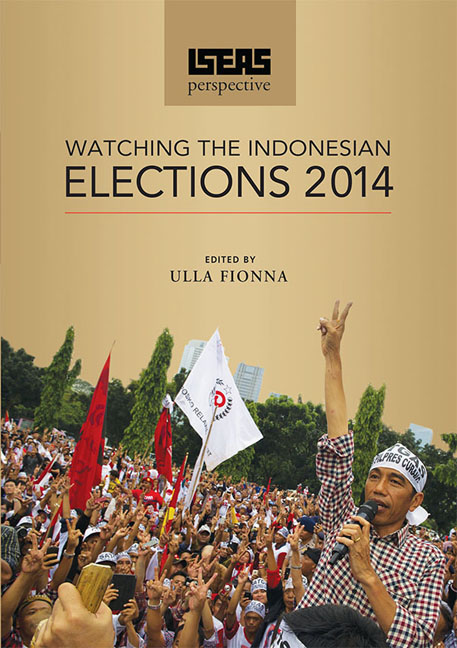Book contents
- Frontmatter
- Contents
- Foreword
- Introduction
- 1 The Gubernatorial Race in Jakarta: Background and Implications
- 2 Indonesian Parties Struggle for Electability
- 3 Who Will Be Indonesian President in 2014?
- 4 Indonesian Presidential Election Forcing Rejuvenation of Parties
- 5 Resisting Democracy: Front Pembela Islam and Indonesia's 2014 Elections
- 6 Getting to Know the Contestants of the 2014 Indonesian Parliamentary Elections
- 7 A Snapshot of the Campaigning in Indonesia's 2014 Legislative Elections
- 8 Unpacking the Results of the 2014 Indonesian Legislative Elections
- 9 Indonesia's 2014 Legislative Elections: The Dilemmas of “Elektabilitas” Politics
- 10 The Islamic Factor in the 2014 Indonesian Elections
- 11 Vote-buying in Indonesia's 2014 Elections: The Other Side of the Coin
- 12 Gap Narrows Between Candidates in Indonesian Presidential Elections
- 13 Analysing the Economic Platforms in the Indonesian Presidential Election
- 14 Indonesian Islamic Parties After the 2014 Elections: Divided and Self-Centred
- 15 Safeguarding Indonesia's Pluralism: An Essential Task for Joko Widodo
- 16 Jokowi's Key Economic Challenge: Improving Fiscal Policy for Equitable Growth
- 17 Crossing the River While Avoiding the Stones: Jokowi's Run-up to the Presidency
- 18 Post-elections Indonesia: Towards a Crisis of Government?
- Epilogue: Jokowi's First Months: Compromise Cabinet, Subsidy Cuts, and Corrupt Coalition
4 - Indonesian Presidential Election Forcing Rejuvenation of Parties
Published online by Cambridge University Press: 29 July 2017
- Frontmatter
- Contents
- Foreword
- Introduction
- 1 The Gubernatorial Race in Jakarta: Background and Implications
- 2 Indonesian Parties Struggle for Electability
- 3 Who Will Be Indonesian President in 2014?
- 4 Indonesian Presidential Election Forcing Rejuvenation of Parties
- 5 Resisting Democracy: Front Pembela Islam and Indonesia's 2014 Elections
- 6 Getting to Know the Contestants of the 2014 Indonesian Parliamentary Elections
- 7 A Snapshot of the Campaigning in Indonesia's 2014 Legislative Elections
- 8 Unpacking the Results of the 2014 Indonesian Legislative Elections
- 9 Indonesia's 2014 Legislative Elections: The Dilemmas of “Elektabilitas” Politics
- 10 The Islamic Factor in the 2014 Indonesian Elections
- 11 Vote-buying in Indonesia's 2014 Elections: The Other Side of the Coin
- 12 Gap Narrows Between Candidates in Indonesian Presidential Elections
- 13 Analysing the Economic Platforms in the Indonesian Presidential Election
- 14 Indonesian Islamic Parties After the 2014 Elections: Divided and Self-Centred
- 15 Safeguarding Indonesia's Pluralism: An Essential Task for Joko Widodo
- 16 Jokowi's Key Economic Challenge: Improving Fiscal Policy for Equitable Growth
- 17 Crossing the River While Avoiding the Stones: Jokowi's Run-up to the Presidency
- 18 Post-elections Indonesia: Towards a Crisis of Government?
- Epilogue: Jokowi's First Months: Compromise Cabinet, Subsidy Cuts, and Corrupt Coalition
Summary
INTRODUCTION
With Indonesian elections about six months away, speculation is mounting about who will be running to become the next directly-elected president. Which sosok (figure) will be chosen to represent the respective parties will be a crucial matter and will strongly influence how the presidential campaign is managed. Parties need therefore to choose their potential candidate very strategically.
Be that as it may, many parties are unable to escape the grip of traditional party authority or dynastic politics. These are either forced to nominate “old faces” or run the risk of not fielding a credible internal candidate. The nomination of veterans such as Aburizal Bakrie (Partai Golkar/Golkar Party), Wiranto (Partai Hati Nurani Rakyat/People's Conscience Party), Prabowo Subianto (Partai Gerakan Indonesia Raya/Great Indonesia Movement Party), and the lack of suitable candidates in Partai Demokrat (PD, Democratic Party) are evidence of this succession problem. Partai Demokrasi Indonesia–Perjuangan (PDI-P, Indonesian Democratic Party Struggle), on the other hand, has developed an alternative system of candidate selection through nurturing local candidates for national leadership.
By all accounts, the battle among the parties to present the most credible presidential candidate will be uncompromising. This essay analyses the strategies of two major parties in their bid to win the popular vote.
PD'S NATIONAL CONVENTION:THE SEARCH FOR SUCCESSOR
PD is by most accounts a success story. It was built as a political vehicle as late as in 2001 to carry Susilo Bambang Yudhoyono in his bid for presidency in the 2004 elections. The party has since then been riding on his success. After a rushed set-up, Yudhoyono's meteoric rise in popularity propelled PD to become the fourth largest political party in 2004 with 7.04 per cent of the votes, behind Partai Golkar (Golkar Party), PDI-P, and Partai Persatuan Pembangunan (PPP, United Development Party). The party's strength grew further in the 2009 elections. It secured more than 20 per cent of the votes and tripled its number of seats in the legislature from 55 seats in 2004 to 148 seats.
Arguably, Yudhoyono's popularity single-handedly carried his party in the last two elections. However, relying too much on one sosok has its consequences.
- Type
- Chapter
- Information
- ISEAS PerspectiveWatching the Indonesian Elections 2014, pp. 25 - 31Publisher: ISEAS–Yusof Ishak InstitutePrint publication year: 2015

